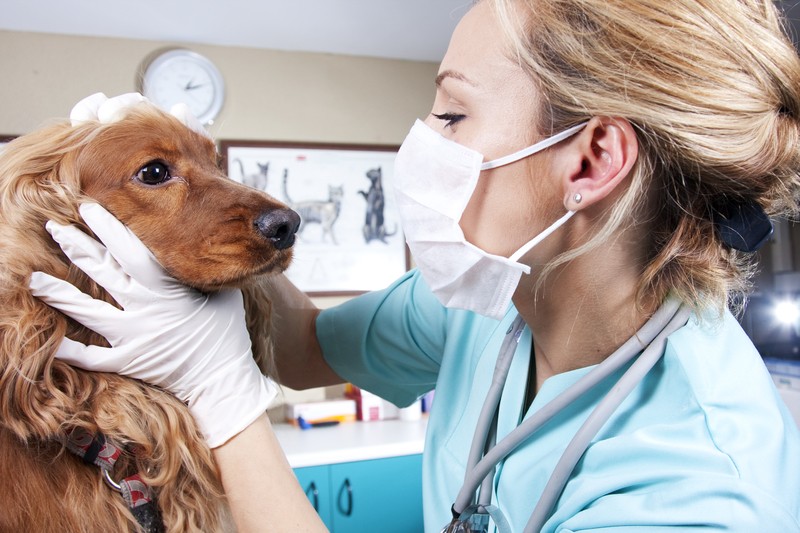If ever you find yourself uncomfortable with diagnosing your own fur child then it’s always a good idea to take him to a vet. This is especially the case if he isn't eating or drinking water or is vomiting a lot. However, for a more common ailment, where home remedies can be practical, read the following.
Ear Infections:
Probably the most prevalent common dog illnesses are ear infections, as they affect both the apartment dogs and the backyard ones. Some of the most common causes are ear mites, yeast, bacteria, ear canal hair growth, allergies, colds and so on. Symptoms include:•Vigorous ear scratching
•Head shaking
•Vulnerability and crying at ear touch
•Redness of the ear canal
•Swelling of the outer areas of the ear
•CryingIf your dog shows such symptoms, you are in your right to suspect an ear infection. Use a cotton ball (but never a Q-Tip) and a gentle non-alcoholic cleansing solution to clean the ear. While it is better to prevent ear infections than to treat them, always go to the vet to assess the situation, as ear infections can lead to more serious health problems.
Worms of All Kinds:
Dogs and internal parasites are sworn enemies, but the truth is that almost all dogs deal with such a threat at least once in their lifetime. There are many kind of worms that dogs attract, and some of them (hookworms) can be fatal in puppies. If your dog suffers from a worm infestation, some of the symptoms include:•Scooting on its bottom
•Loss of appetite
•Diarrhea
•Vomiting
•Weight loss
•Lethargy / or unexplained agitation
•Dryness of the coatIt is not recommended to treat worms on your own. Medicine that kills some of the worms may not kill the other species. There are, however, some remedies that will help the dog feel better until you take it to the vet.
•If your dog accepts some garlic in the food mix a crushed garlic clove in the food
•Introduce raw chopped/grated carrots in the food
•Mince pumpkin seeds in its foodAllergic Dermatitis:
Your pet’s skin should not be flaky, reddish in color, itching, irritated, too dry or too oily or present hair loss patches. These are all signs of allergic dermatitis – caused by many factors including allergies, infections, hormonal imbalances or parasites. The best treatment is got at the vet, as he can diagnose the cause and prescribe an efficient treatment.
However, skin conditions in dogs can be controlled through nutrition. Make sure your dog receives proper quantities of protein, anti-oxidants, and essential fatty acids. Never forget about the preventative methods against fleas and ticks.Dental Disease:
If you heard many times that you should give your dog rawhide chews and teeth-cleaning toys and products, you heard this for all the good reasons. Dental diseases in dogs can also be linked to diabetes, heart diseases, kidney problems, and many more – so you really need to take care of your dog’s teeth. Common symptoms include:•Smelly breath
•Eating and chewing difficulties
•Pain
•Swollen face
•Head shakingThe treatment of a dog’s periodontitis should be performed by a specialist. However, you can try to brush your dog’s teeth (but WITHOUT human toothpaste as it is highly toxic to dogs; use dog toothpaste instead). You can also feed your dog hard foods: raw carrots if it likes them, chewable bones and toys with tooth cleaning properties.
The Flu:
Yes, dogs get the flu, and the symptoms will break your heart. In its mild form, moist or dry coughs, sneezing and runny noses will clearly tell you that you need to quickly take care of your pet. The more severe flu symptoms include fever, breathing problems, bloody coughs, anorexia, runny eyes, and ear infections and so on. In dogs, the flu runs its course even for 30 days in a row, so besides medical treatment, you can contribute to the dog’s well-being:•Provide it with plenty of fresh water
•Keep it in a calm and peaceful, warm and cozy environment
•Avoid taking the dog out in crowded places like parks and kennels
•Introduce garlic in its diet if it supports it
•Offer it a nutritious diet rich in vegetables and herbs that have anti-inflammatory and antibiotic properties. Supplement its diet with Vitamin C-rich veggies.
These are some of the more common illnesses but if you would like to read-up on more go to Pioneer Settler.
We understand that our pooches were not meant to live as long as we humans do but, for as long as they do live, we want them healthy and happy!









